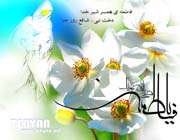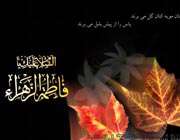Mola ALI A.S BioGraphy
Biography
Amir al-mu'minln Ali (upon whom be peace) was the son of Abu Talib, the Shaykh of the Banu Hashim. Abu Talib was the uncle and guardian of the Holy Prophet (sawas) and the person who had brought the Prophet (sawas) to his house and raised him like his own son. After the Prophet (sawas) was chosen for his prophetic mission, Abu Talib continued to support him and repelled from him the evil that came from the infidels among the Arabs and especially the Quraysh.
According to well-known traditional accounts Ali was born ten years before the commencement of the prophetic mission of the Prophet (sawas). When six years old, as a result of famine in and around Mecca, he was requested by the Prophet (sawas) to leave his father's house and come to the house of his cousin, the Prophet (sawas). There he was placed directly under the guardianship and custody of the Holy Prophet (sawas).
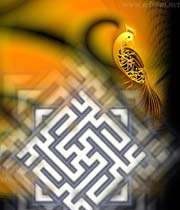
A few years later, when the Prophet (sawas) was endowed
with the Divine gift of prophecy and for the first time received the Divine revelation in the cave of Hira', as he left the cave to return to town and his own house he met Ali on the way. He told him what had happened and Ali accepted the new faith. Again in a gathering when the Holy Prophet (sawas) had brought his relatives together and invited them to accept his religion, he said the first person to accept his call would be his vicegerent and inheritor and deputy. The only person to rise from his place and accept the faith was Ali and the Prophet (sawas) accepted his declaration of faith. Therefore Ali was the first man in Islam to accept the faith and is the first among the followers of the Prophet (sawas) to have never worshipped other than the One God.
Ali was always in the company of the Prophet (sawas) until the Prophet (sawas) migrated from Mecca to Medina. On the night of the migration to Medina (hijrah) when the infidels had surrounded the house of the
Prophet (sawas) and were determined to invade the house at the end of the night and cut him to pieces while he was in bed, Ali slept in place of the Prophet (sawas) while the Prophet (sawas) left the house and set out for Medina. After the departure of the Prophet (sawas), according to his wish Ali gave back to the people the trusts and charges that they had left with the Prophet (sawas). Then he went to Medina with his mother, the daughter of the Prophet (sawas), and two other women.
In Medina also Ali was constantly in the company of the Prophet (sawas) in private and in public. The Prophet (sawas) gave Fatimah, his beloved daughter from Khadijah, to Ali as his wife and when the Prophet (sawas) was creating bonds of brotherhood among his companions he selected Ali as his brother.
Ali was present in all the wars in which the Prophet (sawas) participated, except the
battle of Tabuk when he was ordered to stay in Medina in place of the Prophet (sawas). He did not retreat in any battle nor did he turn his face away from any enemy. He never disobeyed the Prophet (sawas), so that the Prophet (sawas) said, "Ali is never separated from the Truth nor the Truth from Ali."
On the day of the death of the Prophet (sawas), Ali was thirty-three years old.
Although he was foremost in religious virtues and the most outstanding among the companions of the Prophet (sawas), he was pushed aside from the caliphate on the claim that he was too young and that he had many enemies among the people because of the blood of the polytheists he had spilled in the wars fought alongside the Prophet (sawas). Therefore Ali was almost completely cut off from public affairs. He retreated to his house where he began to train competent individuals in the Divine sciences and in this way he passed the twenty-five years of the caliphate of the first three caliphs who succeeded the Prophet (sawas). When the third caliph was killed, people gave their allegiance to him and he was chosen as caliph.
During his caliphate of nearly four years and nine months, Ali followed the way of the Prophet (sawas) and gave his caliphate the form of a spiritual movement and renewal and began many different types of reforms. Naturally, these
reforms were against the interests of certain parties that sought their own benefit. As a result, a group of the companions (foremost among whom were Talhah and Zubayr, who also gained the support of A'ishah, and especially Mu'awiyah) made a pretext of the death of the third caliph to raise their heads in opposition and began to revolt and rebel against Ali.
In order to quell the civil strife and sedition, Ali fought a war near Basra, known as the "Battle
of the Camel," against Talhah and Zubayr in which Ummul Mu'mineen A'ishah, was also involved. He fought another war against Mu'awiyah on the border of Iraq and Syria which lasted for a year and a half and is famous as the "Battle of Siffin. " He also fought against the Khawarij at Nahrawan, in a battle known as the "Battle of Nahrawan." Therefore, most of the days of Ali's caliphate were spent in overcoming internal opposition. Finally, in the morning of the 19th of Ramadan in the year 40 A.H., while praying in the mosque of Kufa, he was wounded by one of the Khawarij and died as a martyr during the night of the 21st of Ramadan. 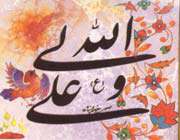
According to the testimony of friend and foe alike, Ali had
no shortcomings from the point of view of human perfection. And in the Islamic virtues he was a perfect example of the upbringing and training given by the Prophet (sawas). The discussions that have taken place concerning his personality and the books written on this subject by Shi'ites, Sunnis and members of other religions, as well as the simply curious outside any distinct religious bodies, are hardly equalled in the case of any other personality in history.
In science and knowledge Ali was the most learned of the
companions of the Prophet (sawas), and of Muslims in general. In his learned discourses he was the first in Islam to open the door for logical demonstration and proof and to discuss the "divine sciences" or metaphysics (ma'arif-i ilahlyah). He spoke concerning the esoteric aspect of the Quran and devised Arabic grammar in order to preserve the Quran's form of expression. He was the most eloquent Arab in speech (as has been mentioned in the first part of this book).
The courage of Ali was proverbial. In all the wars in which he participated during the lifetime of the Prophet (sawas), and also afterward, he never displayed fear or anxiety. Although in many battles such as those of Uhud, Hunayn, Khaybar
and Khandaq the aides to the Prophet (sawas) and the Muslim army trembled in fear or dispersed and fled, he never turned his back to the enemy. Never did a warrior or soldier engage Ali in battle and come out of it alive. Yet, with full chivalry he would never slay a weak enemy nor pursue those who fled. He would not engage in surprise attacks or in turning streams of water upon the enemy. It has been definitively established historically that in the Battle of Khaybar in the attack against the fort he reached the ring of the door and with sudden motion tore off the door and cast it away. Also on the day when Mecca was conquered the Prophet (sawas) ordered the idols to be broken. The idol "Hubal" was the largest idol in Mecca, a giant stone statue placed on the top of the Ka'bah. Following the command of the Prophet (sawas), Ali placed his feet on the Prophet (sawas)'s shoulders, climbed to the top of the Ka'bah, pulled "Hubal" from its place and cast it down.
Ali was also without equal in religious asceticism and the worship of God. In answer to some who had
complained of Ali's anger toward them, the Prophet (sawas) said, "Do not reproach Ali for he is in a state of Divine ecstasy and bewilderment. 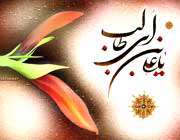
" Abu Darda'', one of the companions, one day saw the body of Ali in one of the palm plantations
of Medina laying on the ground as stiff as wood. He went to Ali's house to inform his noble wife, the daughter of the Prophet (sawas), and to express his condolences. The daughter of the Prophet (sawas) said, "My cousin (Ali) has not died. Rather, in fear of God he has fainted. This condition overcomes him often." There are many stories told of Ali's kindness to the lowly, compassion for the needy and the poor, and generosity and munificence toward those in misery and poverty. Ali spent all that he earned to help the poor and the needy, and himself lived in the strictest and simplest manner. Ali loved agriculture and spent much of his time digging wells, planting trees and cultivating fields. But all the fields that he cultivated or wells that he built he gave in endowment (waqf) to the poor. His endowments, known as the "alms of Ali," had the noteworthy income of twenty-four thousand gold dinars toward the end of his life. | ||||||||||||||||||
| ZIARAAT | ||||||||||||||||||
| Ziarat-e-Ameenallah To be recited at his shrine Ziarat-e-Mutlaqah To be recited on Sunday To be recited on 17 Rabiul Awwal To be recited at Eid-e-Ghadeer (1) To be recited at Eid-e-Ghadeer (2) To be recited at Shab-e-Besat Wida / farewell ziarat Salwat recited when visiting Madina Salwat on Imam Ali (as) Dua after Ziarat of Imam Ali (as) | ||||||||||||||||||
| BOOKS | ||||||||||||||||||
| ||||||||||||||||||
| PHOTO GALLERY | ||||||||||||||||||
   |
About Mola ALI A.S
sourse 2
IMAM AlI'S BIOGRAPHY
Introduction:
All the human beings experience ups and downs and face different problems in life The individuals , usually get weak and unable when facing a problem and try with the aid and guide of the experts to save themselves from the trouble;And by finding the "examples" in any field , and then following them , perform their duties in the best way as to solve their problems and relieve their pains. One of these examples is the honoured prophet (A.S) whom the holy koran has described (indentified) as such.
Other than the messenger of God (A.S) , if we look for another example and replacement for his holiness we would find a great example as the (leader of the) pious his holiness Imam Ali (A.S). Morals and behaviour, to go through his holiness ups and downs, and amazementsof life .
Manner of birth:
His holiness Ali (A.S) is the first child in the family of Bani-Hashem whose both parents are children of Hashem. His father Abu-Taleb is the son of Abdul-Mottaleb the son of Hashem bin Abd-Manaf and his mother is fatemah the daughter of Asad who is the son of Hashem bin abd-manaf. The Hashemi family in the tribe of Qoraish is well-known (famous) for its moral virtues and high (supreme) humanistic characteristics among the Arab tribes.
Magnanimity, generosity, courage and so many other virtues are characteristics of Bani-hashem.Moreover, each of these virtues at its high
est degree exist in his holiness Ali's (A.S) existence. Fatemah, the daughter of Asad went to the holy mosque when labour pain and came close to the wall of Kabaa and said : O God, I have f
irm faith in you,the prophets and the books sent by you and also the speech of my grand father the builder of this house . O God, in consideration to the respect of the one who built this house and for the sake of the child in my womb make the birth of this child easy. An instant later,
in front of the eyes of Abbass bin Abdul-Mottaleb and Yazeed bin Taaf the south east wall of Kabaa cracked and Fatemah entered the Kabaa; the wall closed again.
est degree exist in his holiness Ali's (A.S) existence. Fatemah, the daughter of Asad went to the holy mosque when labour pain and came close to the wall of Kabaa and said : O God, I have f
irm faith in you,the prophets and the books sent by you and also the speech of my grand father the builder of this house . O God, in consideration to the respect of the one who built this house and for the sake of the child in my womb make the birth of this child easy. An instant later,
in front of the eyes of Abbass bin Abdul-Mottaleb and Yazeed bin Taaf the south east wall of Kabaa cracked and Fatemah entered the Kabaa; the wall closed again.
She was the guest of God for three days in the holiest place in the universe and their she gave birth to her child. Three days after the thirteenth
of Rajab, thirty years passed the year of the Elephat;Fatemah , the daughter of Asad, came out of the same cleavage in wall which opened again and said: I heared a message from the unsean to call him Ali.
of Rajab, thirty years passed the year of the Elephat;Fatemah , the daughter of Asad, came out of the same cleavage in wall which opened again and said: I heared a message from the unsean to call him Ali.
Period of childhood:
His holiness Ali stayed with his parents. Since it wa
s God's well for him to gain more perfection, therefore, the honoured prophet from the beginning of his birth took care of his indirect education.
s God's well for him to gain more perfection, therefore, the honoured prophet from the beginning of his birth took care of his indirect education.
Untill an unsual famine occurred in Mecca.Abu-Taleb the uncle of the prophet having many children faced a heavy living expense. The honoured prop
het (A.S) with the consultation of his uncle Abbass,came to agreement that each one of them take one of the children of Abu-Taleb with him as to make a relief for Abu-Taleb. Therefore Abbass took Jaffar and the prophet (A.S) took Ali (A.S) to his house.
het (A.S) with the consultation of his uncle Abbass,came to agreement that each one of them take one of the children of Abu-Taleb with him as to make a relief for Abu-Taleb. Therefore Abbass took Jaffar and the prophet (A.S) took Ali (A.S) to his house.
In this way his holiness Ali (A.S) was completely besides the prophet (A.S).Ali (A.S) was always accompanying the prophet (A.S) even when the prophet (A.S)would leave to town and go to the mountain and desert.
Appointment of the prophet (A.S) and his holiness Ali (A.S):
There is no doubt that acceleration in good deeds is a kind
of privilege virtue and (the exalted) God in several verses asked his salves to perform them and called them to compete with each other. One of the virtues of his holiness Ali (A.S) is that he is the first one to believe in the prophet (A.S).Ibn Abeel Al-Hadeed says related to this : Know that among the great , big and scholastic theologians of the Mutazilites there is no dispute that Ali bin Abee-Taleb is the first person to believe in Islam; and to support the messenger of God.
of privilege virtue and (the exalted) God in several verses asked his salves to perform them and called them to compete with each other. One of the virtues of his holiness Ali (A.S) is that he is the first one to believe in the prophet (A.S).Ibn Abeel Al-Hadeed says related to this : Know that among the great , big and scholastic theologians of the Mutazilites there is no dispute that Ali bin Abee-Taleb is the first person to believe in Islam; and to support the messenger of God.
His holiness Ali (A.S) the first supporter to the honoured prophet (A.S) :
After the revelation of God , the selection of his
holiness the prophet Mohammad (A.S) for prophethood and the three years of secret preaching, finally,the messenger of revelation arrived and the order for public preaching was given.
holiness the prophet Mohammad (A.S) for prophethood and the three years of secret preaching, finally,the messenger of revelation arrived and the order for public preaching was given.
At this juncture, his holiness Ali (A.S) was
the only enforcer of the prophet (A.S) plans in his divine propagation; And was the only companion and sympathetic to his holiness in the invitation arranged to acquainte his relatives to Islam and to call them to the religion of God.In this invitation the prophet (A.S) asked the people present: "who is among you to help me in this way so to be my brother, successor and representative among you". Only Ali (A.S) answered :
"O prophet of God, I will support you in this way".
the only enforcer of the prophet (A.S) plans in his divine propagation; And was the only companion and sympathetic to his holiness in the invitation arranged to acquainte his relatives to Islam and to call them to the religion of God.In this invitation the prophet (A.S) asked the people present: "who is among you to help me in this way so to be my brother, successor and representative among you". Only Ali (A.S) answered :
"O prophet of God, I will support you in this way".
The prophet (A.S) after three times repeating the
question and hearing the same answer said : O my relatives ; Know that Ali (A.S) is my brother , successor and Caliph after me among you. Of the other glories of his holiness Ali (A.S) is his perfect courage in sleeping in the prophet's (A.S) bed , therefore, nullifing the plot o
f the idol-worshipers to kill the prophet; And , farthermore, prepared the ground for the prophet's (A.S) migration.His holiness Ali (A.S) after the migration :After the migration of his holiness Ali (A.S) and the prophet (A.S) to Madina, we explain two examples of the virtues of Ali (A.S):1- Self-sacrifice and endangering in the
field of struggle His presence in 26 battles of the 27 battles of the prophet (A.S) and participation in different expeditions are of the glories and virtues of his holiness.2- Registering (keeping) and writing the revelation [koran]: Writing the revelation, organizing (arranging) many of the historical and political documents and writing propagational and invitation letters, both in Mecca and Madina, And for this reason he is considered one of the writers of the revelation and memorizers of the Koran.
question and hearing the same answer said : O my relatives ; Know that Ali (A.S) is my brother , successor and Caliph after me among you. Of the other glories of his holiness Ali (A.S) is his perfect courage in sleeping in the prophet's (A.S) bed , therefore, nullifing the plot o
f the idol-worshipers to kill the prophet; And , farthermore, prepared the ground for the prophet's (A.S) migration.His holiness Ali (A.S) after the migration :After the migration of his holiness Ali (A.S) and the prophet (A.S) to Madina, we explain two examples of the virtues of Ali (A.S):1- Self-sacrifice and endangering in the
field of struggle His presence in 26 battles of the 27 battles of the prophet (A.S) and participation in different expeditions are of the glories and virtues of his holiness.2- Registering (keeping) and writing the revelation [koran]: Writing the revelation, organizing (arranging) many of the historical and political documents and writing propagational and invitation letters, both in Mecca and Madina, And for this reason he is considered one of the writers of the revelation and memorizers of the Koran.
It was in this period that the prophet (A.S) issued the decree of Moslems brotherhood, concluded the contract of brotherhood with his holiness Ali (A.S) and said to his holiness Ali (A.S): "You are my brother in this world and in the here after, swearing by the God who has appointed me with the truth. I choose you as my brother, a brotherhood that is to the extent of both worlds".
His holiness Ali (A.S) the son-in-law of the honoured prophet (A.S):Omar and Abu-Bakr with the consulation with Saad Maath the head of the tribe of Aws realized (found out) that there is no body other than Ali (A.S) competent (appropriate) for Zahra (A.S) . therefore, when Ali (A.S) was among the trees of the garden of one of the Ansar busy watering. They suggested this subject to him and he said : "I love the daughter of the prophet (A.S). "And went towards the house of the prophet (A.S) . When he reached to the honoured prophet (A.S) the glory of the presence of the prophet (A.S) prevented him from speaking until the honoured prophet (A.S) asked for the reason for his return;Then his holiness Ali (A.S) depending on his virtues , piety and bright past in Islam said: "do You deem it wise for me to marry Fatemah". After the acceptance of Zahra (A.S) his holiness Ali (A.S) won becoming the son-in-law of the honoured prophet.
The pond of Khom :
In the last Year of his holiness the prophet's (A.S) life , after finishing the rituals of piligrammage and when returning in a place called the Khom pond close to Johfa , he Ordered to stop, because the revelation commanded the prophet (A.S) to complete his message.After the noon prayer the prophet went up the (minbar) pulpit of the camels' saddles and said: "O people, it is soon that I answer the call of God and go from among you. what do you think about me" .People said: "we witness that you have propagated the religion of God".Prophet (A.S) said:" Don't you witness that there is no God but the one God and Mohammad is his slave and messenger".People said:"Yes, we witness".Then the prophet (A.S) raised the hand of his holiness Ali (A.S) and said:"O People! among the believers who is more worthy than them selves.People said : "God and his prophet know better" .Then the prophet said:" O People who ever Iam his master and leader; Ali is his master and leader.And repeated this sentence three times.then the people congratulated this selection to his holiness Ali (A.S) and swore allegience to him.
His holiness ali (A.S) after the death of the honoured prophet (A.S) :
After the death of the honoured prophet (A.S) because of special conditions that arised, his holiness Ali (A.S) with draw from the scene of the society and choose silence; He neither participated in any struggle nor spoke officially in the society . He put the sword in the sheath and engaged with individual duties and educating the individuals.
Activities of Imam Ali (A.S) in this period were/briefly as follows :
1- Worshiping God , according to the level of his holiness Ali (A.S).
2- Interpretation of the koran, solving religious problems and decreeing the rule of incidents that didn't have a resemblance along the 23 Years of the prophet's life.
3- Answering to questions of scholars from other religions and other towns.
4- Expressing the rule for many of the new events which didn't occur previously in Islam.
5- Solving the problems when the caliphate system faced dead ends in political matters and some other problems.
6- Educating and raising a group who have pure con science and prepared soal for spiritual journey.
7- Work and strife to secure the life of many of the poor and disabled to the extent that he would establish gardends and extract aqueducts and then would give them as endowments in the way of God.
Period of the caliphate of his holiness Ali (A.S) in the time of his holiness caliphate many wars occurred as Seffin, Jamal and Nahrawan which had specific consequences following.
After the war of Nahrawan and the suppression of the Kharijites. Some of the Kharijities among whom was Abdul-Rahman bin Moljam Moradi
and Barak bin Abdulla Tameemi and Amr bin Bakr-tameemi in one of the nights
got together and considered the ciruims tances of that time the blood-sheds and civil wars and
remembered Nahrawan and their deads and finally reached to this conclusion that the reason
for this blood-shed and brothers killing are his holiness Ali (A.S), Moawiah and Amr bin
Aass and if these three one removed the moslems will know there duties therefore, they concluded
the treaty that each one of them he responsible for killing one of the three.
Ibn Moljam undertook killing Imam
Ali (A.S) and on the ninetheenth night of the month of Ramadan accompanied with some stayed in the mosque of Koofa. That night his holiness Ali (A.S) was a guest of his doughter's and
was aware of the morning accident. When he mentioned this subject to his daughter. Om-Kolthoom said: Tomorrow send Joada to the mosque.
His holiness Ali (A.S) said: It is not
possible to escape the Godly decree, then he fastened his belt and while humming these two verses he went to the mosque.Fasten your back firmly for death Because death will meet you and
when death comes to you don't fear
or scream While his holiness Ali (A.S) was in prostation, Ibn Moljam hit him with the sword on his forehead and blood from his holiness head streamed in the
altar and blood dyed his honoured
beard. In this condition his holiness said: I swear by the God
of Kaaba that I won. Then reate verse 55 from soora Taha:From it we created you and into
it we shall send you back and from it we raise you a second time.
This holiness Ali was at his last moment
of his life still thinking of the welfare and happiness of the peoples adviced his chidlren relatives and all the moslems saying : Idvice
you of piety and to organize your deeds and always think of causing reconciliation among the moslems.
Dont forget the orphans, regard the
rights of the neighbours.Make Koran the practical programme for yourself.Respect (honour) praying because it is the pillar
of your religion.His holiness Ali (A.S) attained
martyrdom on the 21 st of the month of Ramadan and was burried in the honoured Najaf . His shrine became the tryst for the lovers of the truth and reality.
01- Soora Ahzab, verse: 21.
02- Foroogh welayat, p.35 (kashf Al-Ghoma v.1 , p.9)
03- Aftab welayat, p.19 (Al-Kharaej and Al-Jaraeh v.1 , p.171)
04- Aftab welayat, p.19 (Behar Al-anwar v.35 , p.18)
05- Aftab welayat, p.37 (seerah bin Hesham v.1 , p.236)
06- Aftab welayat, p.38.
07- Aftab welayat, p.131 (Soora Bakara , verse:148)
08- Aftab welayat, p.86 (Mostadrak Hakem v.3 , p.14 Isteeaab , v.3 , p.35)
09- Aftab welayat, p.141 (Soora Maeda , verse:47)
10- Aftab welayat, p.697.
11- Aftab welayat, p.697 (Behar Al-Anwar quoting from Amali , v.9 , p.650)
12- Aftab welayat, p.697.
Tasbeeh Bibi Fatima s.a
Allahu Akbar' - 34 times, 'Alhamdulillah' - 33 times and 'Subhanallah' - 33 times.
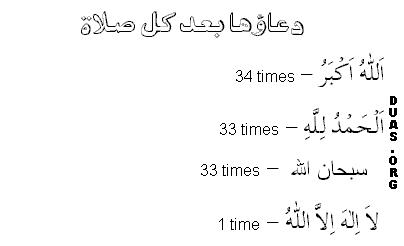

The Tasbeeh of Hazrat Fatima Zahra (s.a.) is from the emphatically recommended acts of worship in the Islamic Shariat. It has immense significance in the eyes of the infallible Imams (a.s.) and the Shiite jurists. It is a simple ,short yet very powerful act of worship from the aspect of performance; its effect, reward and merit are abundant. This can be gauged from the fact that when the Holy Prophet (s.a.w.a.) wished to impart this act of worship to his daughter Lady Zahra (s.a.), he declared,
‘O Fatima! I have granted you something that is superior to a maidservant and to the world and everything in it.’ (Aasaar o Asraare Tasbeehe Zahra (s.a.) , Pg. 7)
In this context Imam Muhammad Baqir (a.s.) informs, ‘Allah is not worshipped by anything more meritorious than the Tasbeeh of Fatima Zahra (s.a.). Had there been any worship superior to it, most surely the Holy Prophet (s.a.w.a.) would have granted it to Janabe Fatima (s.a.).’(Wasaaelush Shia , Vol 4 Pg. 1024)
Imam Jafar Sadiq (as) says about the dearness of this Tasbeeh in the eyes of the Imams of the Ahlulbayt (a.s.):
“Reciting Tasbeeh of Hazrat Zahra (s.a.) everyday after every Salat is liked by me more than reciting one thousand rakats of (mustahab) namaz”.(Al-Kafi, Kitabus Salaat)
Reciting this Tasbeeh results in forgiveness of sins. In a tradition , Imam Mohammad Baqir (as) says:
“One who recites the Tasbeeh of Hazrat Zahra (s.a.) and then seeks forgiveness, will be forgiven”. (Wasaaelush Shia Vol 4, Pg. 1023)
It also results in driving Shaitan away and in the satisfaction of Allah as tradition from Imam Mohammad Baqir (a.s.) says:“(Reciting Tasbeeh) drives away Shaitan and makes results in the satisfaction of Allah”. (Wasaaelush Shia Vol 4, Pg. 1023)
Reciting Tasbeeh regularly delivers the reciter from adversities in this world as well as the hereafter. One of the graceful effects of the regular recitation of the Tasbeeh of Hazrat Zahra (s.a.) is that it delivers the reciter from adversities and hardships in this world as well as the hereafter. Thus one should not ignore its benefits and effects and should not be careless and lazy in its recitation
In this connection, Imam Jafar Sadiq (as) says to one of his companions :
“ You do adhere to it and be regular about its recitation, for surely one who is steadfast upon its recitation will not encounter adversity.” (Al-Kafi, Kitabus Salaat, Pg. 343)
How to recite Tasbeeh of Hazrat Zahra (s.a.):
According to a tradition from Imam Jafar Sadiq, one should recite Allaho Akbar 34 times, Alhamdolillah 33 times and Subhaanallah 33 times.(Behaarul Anwaar Vol 85, Pg. 334)
Reciting Tasbeeh immediately after Salat
Tasbeeh of Hazrat Zahra (s.a.) should be recited immediately on completion of Namaz. This entails that as soon as the reciter has finished the Namaz, he should remain seated in the same position of Tashahud without moving his feet and doing any other thing, immediately he should commence the recitation of the Tasbeeh. The reciting of Tasbeeh immediately on completion of Namaz has a special excellence, which is not there otherwise.
The above statement can be evidenced by the following tradition of Imam Jafar Sadiq (as) wherein he states: “One who recites the Tasbeeh of Hazrat Zahra (s.a.) before even moving his feet, Allah will forgive him..” (At-Tahzeeb of Shaikh Toosi (r.a.) , Vol 2, Pg. 105)
Imam Jafar Sadiq (as) has said :
“One who recites the Tasbeeh of Hazrat Zahra (s.a.) after a wajib namaz before he stretches out his legs ( i.e. he recites the Tasbeeh while he is in the posture of Tashahud) , then Jannat becomes wajib upon him” (Falaahus Saael by Ibne Taaoos (r.a.), Pg. 165)
Another tradition from Imam Sadiq (a.s.) says:
“One who glorifies Allah after the obligatory prayer through the Tasbeeh of Hazrat Zahra (s.a.), and then follows it up by saying ‘Laa elaaha illallaho’, Allah will forgive his sins.” (Al-Kafi, Kitabus Salaat, Pg. 342)
Reciting the Tasbeeh of Syeda Zahra (s.a.) before sleeping
Imam Jafar Sadiq (as) says :
“One who recites the Tasbeeh of Hazrat Zahra (s.a.) at the time of going to bed, he will be accounted amongst those who have remembered Allah a lot.” (Wasaaelush Shia Vol 4, Pg. 1026)
In the book ‘Wasaaelush Shia’ there is a tradition from Imam Mohammad Baqir (as) which says that at the time of going to bed, Tasbeeh of Hazrat Zahra (s.a.)and then Maoozatain (Surah Falaq and Surah Naas) and Ayatul Kursi should be recited.
Teaching the recitation of Tasbeeh to the children
In this connection, Imam Jafar Sadiq (as) says : “ O Abu Haroon! We order our children to recite the Tasbeeh of Hazrat Zahra (s.a.)in the same manner as we order them for the performance of Namaz ” (Al-Kafi, Kitabus Salaat, Pg. 343)
Reciting Tasbeeh made out of the Turbah of grave of Imam Husain (a.s.)
It is better that the Tasbeeh of Hazrat Zahra (s.a.) be made of the pure Turbah (soil) of the grave of Imam Husain (a.s.)
It has been narrated from Imame Zamana (a.t.f.s.), “ One who just holds the Tasbeeh made out of the soil of the grave of Imam Husain (as) and does not do any Zikr, even then for him will be written the reward of having recited the Azkaar” (Wasaaelush Shia Vol 4, Pg. 1033)
Imam Jafar Sadiq (as) says : “One zikr or Isteghfaar recited on the Tasbeeh made out of the soil of the grave of Imam Husain (as) is equal to 70 such zikr recited on any other thing.” (Wasaaelush Shia Vol 4, Pg. 1033)
Some noteworthy points:
1. One of the conditions of worship, rather the most important of them all, is being attentive in its performance. This is specially so in the recitation of Tasbeeh of Hazrat Zahra (s.a.).
2. There should be continuity in the recitation of the Tasbeeh without any interruptions. This has been the practice of our holy Imams (a.s.) (Al- Kaafi, Kitaabus Salaat, Pg. 343 )
1. In case one has a doubt regarding the number of Azkaar that he has recited, then he should start again. This is according to a tradition from Imam Sadiq (a.s.) (Al- Kaafi, Kitaabus Salaat, Pg. 342 )
Thus, by the grace of Allah and the blessings of Imam Mahdi (a.t.f.s.) , we have come to realize the importance of reciting Tasbeeh of Hazrat Zahra (s.a.) and its merits. We pray to Allah to grant us the Taufeeq that we may be regular in its recitation.
The Tasbeeh as a Powerful Dua for Any / All needs
In case of a particular need /problem ,this tasbeeh is to be recited with that specific intention for the need to get fulfilled .Eg it is highly recommended for security of Rizq /Sustenance if recited with that specific intention at the door or in car when leaving for work /interview etc
BIBI FATIMA SA BIOGRAPHY
| BIOGRAPHY | |||||||||||
The light of Holy Fatimah's existence was made with that of the Holy Prophet SAWS much before the creation of the Universe. However visible existence came into being on 20th Jamad us Sani (5th year after the declaration of Prophethood) on friday. The year was 615 A.D. At the time of our lady's birth there were heavenly nymphs and pure women who descended from heaven to carry out the duty of delivery. These pious and pure women included: -- Lady Mariam daughter of Imran (mother of the Prophet Jesus) -- Asia daughter of Mauzahim -- Safoora daughter of Shoaib -- Kulsum sister of the Prohet Moses Lady Khadijah on account of the delivery shows that as she had married without the consent of her tribe with the Prophet SAWS. The tribe had done a total boycott of her. However with the grace of Allah heavenly nymphs and pure and pious women did the delivery of our Lady fatimah SWT.  It is an established fact that the Lady Fatimah (SWT) and Prince Qasim Abdullah were from Hazrat Khadijah and the Holy Prophet SAWS. The difference arises between Shia and other sects that the Prophet SAWS had other daughters which were Zainab, Rukkya (Wife Hazrat Usman) and Umme Kulsum. It is a known truth that these three daughters were wedded to pagans. The names of which include Abul Aas bin Rabi. Refrence is available from Masudi's accounts. However this above information is incorrect. The Prophet of Islam would never marry his daughters into the pagans. These three daughters were actually the nieces of the Lady Khadijah (R.A). However as Lady Khadijah was a woman of dignity and high calibre, she treated her nieces gently and lovingly as though they were her own daughters. These nieces were called daughters of the Holy Prophet SAWS as Zaid was called his son. However in actual fact they were not Holy Prophet's (SAWS) children. When the Holy Prophet SAWS married Lady Khdijah at that time the Holy Prophet's age was 25 years. It is unanimously accepted that the Prophet SAWS had no children till the age of 30. It is also accepted that these three daughters were married before the revelations came. This means that the Holy Prophet SAWS in 10 years had three daughters married and also married them of. Certainly this is illogical and impossible. This proves that the Prophet SAWS had just two children. Qasim Abdullah (Died in Infancy) and Our Lady Fatimah(SWT). 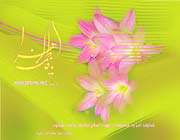 Our Lady was totally different from the rest of the girls of that age. Umme Salma was asked to teach Our Lady principles of Culture. However Umme Salma replied that what could she teach the model of purity and chastity and I myself would take knowledge and teaching from this Baby girl. Books written by various writers indicates that Our Lady's entire young age was spent serving her parents and praying to the All Mighty Allah. Oneday when the Prophet SAWS was praying in the courtyard of the Holy Kaaba. The accursed AbuJahl (Uncle of Hazrat Umar) saw the Prophet in prostration to Allah. He put a tripe laden with compost of the camel on the Holy Prophet's back. When the news of this act reached the Holy Fatimah (SWT) she came running and removed the tripe of the Prophet of Islam's Back. Then washed the Holy back with water. On this occasion the Prophet (SAWS) said: "Daughter! One day these enemies will be subdued and the lord will give my religion utmost superamacy." It has been reported that Lady Khadijah (R.A) was preparing to go to a wedding. When she started to put her clothes on she was informed that Our lady had no clothes. This made Lady Khadijah (R.A) to be worried but when Our Lady got to know about her mother's anxiety that her daughter had no clothes. Our lady Fatimah (SWT) said : "Dear Mother! I will go wearing old clothes, because father dearest says that the best jewellery for muslims girls is life of piety and absitence and the best decoration is modesty and bashfulness." Lady Fatimah (SWT) system of work After going to His Holiness (Imam Ali (A.S)) house. Our Lady Fatimah (SWT) established such a system that is a model for all the women of the world to follow. Her Holiness (SWT) did all the household work alone . The work included cooking food, weaving, grinding the flour by the use of a handmill, sweeping and Trainning the two young Holy Imams Hassan (A.S) and Imam Hussain (A.S) and the two princesses Her Holiness Lady Zenab (SWT) and Her Holiness Lady Umme Kulsum (SWT). All these works our Queen used to do but never was there a change Her Holiness's temprament nor did Her Holiness (SWT) ever complaint to Imam Ali (A.S).Her Holiness Lady Fatimah (SWT) never asked for a slave girl. However when Our Lady (SWT) was given a maid in the 7th year of Migration of the Holy Prophet (SAWS) from Mecca to Medina. Her Holiness (SWT) treated the servant not as a servant but as if a close friend and associate. Oneday Our Lady (SWT) used to do the chores of the house and the next day Lady Fizza (The Maid of Her Holiness Lady Fatimah SWT) used to do the work. Hence the system was of taking turns at doing the work of the House. This system adopted by Her Holiness (SWT) made Lady Fizza feel like a part of the House and not as a servant. Actually this was a true example of the House of the Prophet (SAWS) system of equality. | |||||||||||
| ZIARAAT | |||||||||||
| To be recited in Madina To be recited at her martyrdom Wida / Farewell Ziarat Salwat on Hazrat Fatima (sa) Ziarat of Hazrat Fatima (sa) to be recited on Sunday | |||||||||||
| BOOKS | |||||||||||
|
BIBI ZAINAB S.A
Bibi zainab s.a biography
|
There is divergence of opinions about the date of birth of Sayyida Zainab (sa) / Hazrat Zainab Kubra (sa). Some say it was 5th in the month of Jamadi Al-Awwal of Islamic calendar, and others say it was 1st in the month of Shabaan, in the 6th Hijrah year 625 AD.
Sayyida Zainab (sa) is the elder daughter of Imam Ali (as) and Hazrat Fatima Zahra (sa), and eldest granddaughter of Prophet Muhammad (saw) and Ummul Momineen Hazrat Khadijah (sa). She was the third child of the family i.e. she was born after Imam Hussain (as). She is the sister of Imam Hasan (as) and Imam Hussain (as), Sayyid Shabab ul Jannah. Her younger sister is Hazrat Umm-e-Kulsoom (sa).
We send our congratulations to our twelfth Imam, Imam Muhammed Al-Mahdi (A.T.F.S), our righteous Ulama, and to the Muslim World and to all the Momineen and Mominaat on the Birth Anniversary of Sayyida Zainab(s.a.) daughter of Imam Ali (a.s)
We extend our Joyous and Happy Greetings and Felicitations to all the followers and lovers of Holy Ahlul Bayt ( A.S.) in the world.
We extend our Joyous and Happy Greetings and Felicitations to all the followers and lovers of Holy Ahlul Bayt ( A.S.) in the world.
Naming the Child and meaning of Zainab (Adornment of her Father)


It was five years after the Muslims had accompanied Prophet Muhammad (saw) and his family in the migration (Hijrah) to Medina from Makkah, when Prophet Muhammad's (saw) daughter, Hazrat Fatima Zahra (sa), gave birth to a little girl. When her father, Imam Ali (as), saw his daughter for the first time Imam Hussain (as), who was then almost three years old, was with him. The boy exclaimed in delight, "O father, Allah (SWT) has given me a sister." At those words Imam Ali (as) began to weep, and when Imam Hussain (as) asked why he was crying so, his father answered that he would soon come to know.
At the time when Hazrat Fatima Zahra (sa) gave birth to Sayyida Zainab (sa), Prophet Muhammad (saw) was not in Medina. When Sayyida Zainab (sa) was born, Hazrat Fatima Zahra (sa) told Imam Ali (as), "Since my father is on the trip and is not present at this moment, you choose a name for this child." Imam Ali (as) said, "I will not precede your father (in naming this child); wait until he [Prophet Muhammad (saw)] returns. Then he will name this child whatever he prefers best."
Three days later Prophet Muhammad (saw) returned from his trip and like all other times, he first went to Hazrat Fatima Zahra's (sa) house to greet them. Imam Ali (as) told Prophet Muhammad (saw) about the newborn baby and how they waited for his return, to name this baby.
Prophet Muhammad (saw) said, "even though Fatima Zahra's (sa) children are my children, I will wait for a revelation because this matter is with Allah (SWT)." At this moment Gabriel (Jibreel) descended and said, "O Messenger of Allah, the Lord sends his regards upon you and says, "Name this child 'Zainab' because we have written this in a preserved tablet (Lauh-e-Mehfooz)."
Then Prophet Muhammad (saw) asked them to bring the newborn baby. He held her close to his chest, kissed her, and named her Zainab. Afterwards he said, "My will to the people, to those who are present and to those who are absent is to keep the respect for this child, for she truly resembles Khadijah."
Then Gabriel (Jibreel) began to weep. Prophet Muhammad (saw) asked why Gabriel (Jibreel) wept and he answered, "O Messenger of Allah, from early on in life this girl will remain entangled in tribulations and trials in this world. First she will weep over your separation (from this world); thereafter she will bemoan the loss of her mother, then her father, and then her brother Hasan. After all this she will be confronted with the trials of the land of Karbala and the tribulations of that lonely desert, as a result of which her hair will turn grey and her back will be bent."
When the members of the family heard this prophecy they all broke down in tears. Imam Hussain (as) now understood why earlier his father had also wept.
Note: The name Zainab is derived from the two root words "Zain" and "Ab", which means the Adornment of her Father.
Birthday of Sayyida Zainab (sa) is observed as Nurse's Day in Iran




Nurse a word full of meaning, a word that is a correct and accurate definition of friendship, generosity, sacrifice and forgiveness. A nurse does not distinguish between night and day. As an angel, she appears at the bedside of the sick, stroking their head. A nurse spends her life on people. The moment of a patient's release from a hospital is the sweetest moment in a nurse's life. If her patient suffers, a nurse shares in the suffering. In certain situations, a nurse shows such benevolence toward her patient that the patient's closest kin are not prepared to render such service.
A nurse's occupation is not an ordinary one. Nursing is a sacred and valuable profession. A nurse does not work for money or material benefits, for the wages she receives do not compensate of her untainted labors. When a nurse sees that her patient's life is in danger, she forgets everything and becomes selfless. Birthday of Sayyida Zainab (sa) is observed as Nurse's Day in Iran.
At the height of the Islamic month of Muharram, in the year 61, after Hijrah, on the night of Ashura, when the devilish enemy set the Ahlul Bayt's (as) tent on fire and drove the children to the desert in the night, Sayyida Zainab (sa) tended women and children in a half-burnt tent, shared in their sorrow with patience and endurance, and nursed the feverish patient of Karbala, Imam Sajjad (as). Perhaps the endurance, love and sacrifice of a nurse at the bedside of the sick is a manifestation of the patience, endurance and boundless sacrifice of Sayyida Zainab (sa).
Therefore, it is appropriate that observing and honoring this toiling stratum of society have named the auspicious birth of the Lady of Islam named 'Nurse's Day'. Sayyida Zainab (sa) was the founder of the struggle and achievements of martyrs, one who was able to cast to the wind the empty and chimerical desires of Yazid son of Muawiya and his followers, and not only preserve Islam, Prophet Muhammad (saw), and the blood of Imam Hussain (as) in our memories, but bring a thousand messages of bravery, resistance and struggle for human rights to her descendants.
She is a model of resistance and sacrifice; in the rebellion of Ashura and in the most turbulent conditions, she nursed the injured in the best possible manner, one of the most beautiful manifestations of nursing.
When a nurse is a model, with special characteristics gathered within her, it is as if she were the protector of moral values, law abidance, the protector and executor of our higher duties, sympathetic, kind, conscientious, independent, shouldering responsibility, hard-working and untiring.
Sayyida Zainab (sa) was not only a nurse for women and children. She nursed those who had suffered in body and soul, those whose clothing and skin had burned in the frightening tent fire at dusk on Ashura, those who had suffered mentally, those who had heard rejoicing in their miseries. This nursing began at dusk on the day of Ashura and continued to Kufah, Karbala and Medina.
An important lesson one can learn from this strange life full of vicissitudes is that no difficulty prevented Sayyida Zainab (sa) from carrying out her responsibilities - not the death of her dearest kin, not her physical and mental sufferings.
Sayyida Zainab (sa) and her dream at young age [Hazrat Zainab Kubra (sa)]

One day, when Sayyida Zainab (sa) was about five years old, she had a strange and terrible dream. A violent wind arose in the city and darkened the earth and the sky. The little girl was tossed hither and thither, and suddenly she found herself stuck in the branches of a huge tree. But the wind was so strong that it uprooted the tree. Sayyida Zainab (sa) caught hold of a branch but that broke. In a panic she grabbed two twigs but these too gave way and she was left falling with no support.
Then she woke up. When she told her grandfather, Prophet Muhammad (saw), about this dream he wept bitterly and said, "O my daughter that tree is me who is shortly going to leave this world.
The branches are your father Ali and your mother Fatima Zahra, and the twigs are your brothers Hasan and Hussain. They will all depart this world before you do, and you will suffer their separation and loss."
Sayyida Zainab (sa) was only five or six when her grandfather, Prophet Muhammad (saw) passed away. Just six months later, she lost he mother, the Prophet's daughter, Hazrat Fatima Zahra (sa). When on her death bed, Hazrat Fatima Zahra (sa) said: "My dear, do not leave your brothers alone, take good care of them, be a loving sister and be so kind to them as if you were a mother to them." Sayyida Zainab (sa) followed her mother's advice as long as she lived.
It is important to note that both Hazrat Fatima Zahra (sa) and Hazrat Zainab Kubra (sa) lost their respective mothers at the age of only five years old. Hazrat Umm-e-Kulsoom (sa) was four years old at the time of her mother's martyrdom.
Two devotions in one Heart can not exist; Love for the sake of Allah (SWT)

The Fitra (A soul that was inspired with the faculty of knowing what is evil and what is good) of each person constantly yearns to reach perfection. In order to reach the degree of perfection however, one should seek to find the means of approach to the Allah Almighty. The first step in seeking closeness to Allah (SWT) is to gain knowing of Allah (SWT). One of the great persons who have gained this knowing and closeness to Allah (SWT) after the fourteen Infallibles - Prophet Muhammad (saw), Hazrat Fatima Zahra (sa), and the Imams (pbut) - is Hazrat Zainab Kubra (sa). Though we cannot fully describe her status and knowledge about Allah (SWT), we will only touch on a few cases to illustrate this knowledge.
She was famous for her knowledge during her childhood ages. Once she asked her father Imam Ali (as): "Do you like me?"
Imam Ali (as) replied, "Yes."
Then she continued, "There are two affections - the love of Allah (SWT) and the love for children - that overflow the heart of every believer. Thus the base of this affection is that the actual and main affection is for Allah (SWT), and the sympathy and compassion is for the children. And this affection (to the children) is based on this main affection to Allah."
Imam Ali (PBUH) confirmed her and praised her. This degree of knowledge in this young period of her life is a proof for her deep inward knowing of the creator.
Another case is on the day of Ashura, when she offered her young son to Imam Hussain (as) to fight in the battle of Karbala, she said, "If fighting in war (Jihad) was allowed for women, I would have sacrificed thousands of (my) lives for the Lord!" What wisdom and courage Hazrat Zainab Kubra (sa) has to sacrifice her young son in the way of Allah (SWT). It is clear that her patience and devotion derives from the wisdom she has in knowing Allah (SWT) and His Hujjah - chosen representative of Allah (SWT) - Imam Hussain (as).
Subscribe to:
Comments (Atom)





